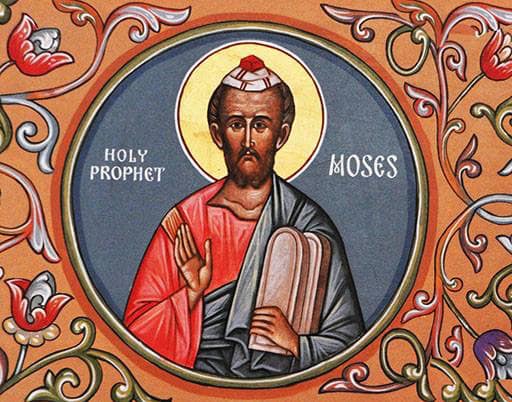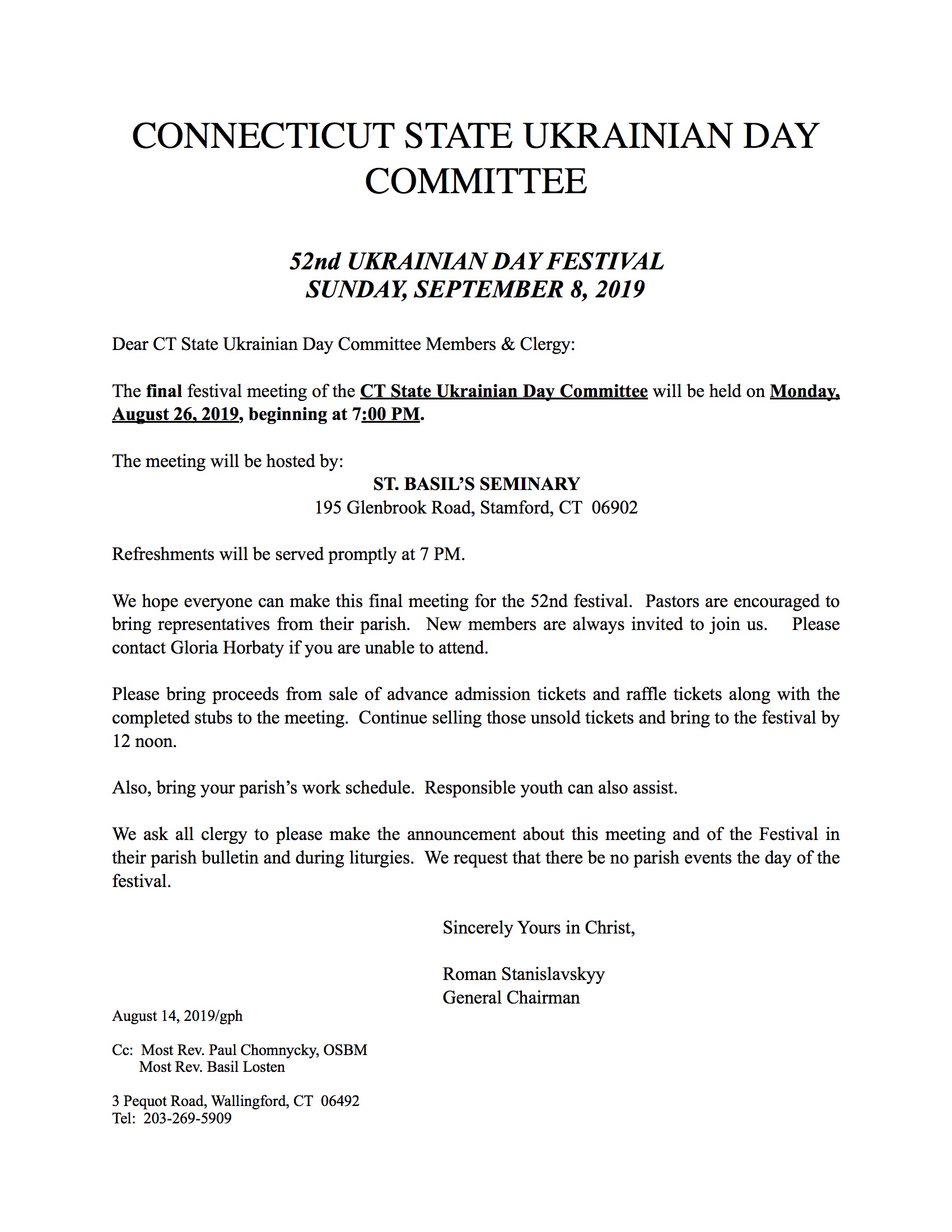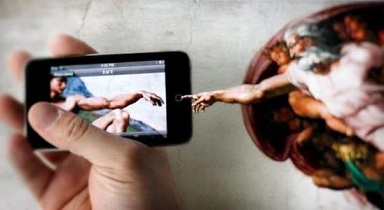Christ is in our midst!
This week’s vigil light is offered to God’s glory by Cathy Kolesnik for God’s blessings and good health for Barbara and Patrick Bagley.
Reposed: Last week Sophie Ciukenda fell asleep in the Lord. Please pray for the repose of her soul. May her memory be eternal!
During my vacation, you can call Fr. Stepan Yanovski (203) 468-0367, or Fr. Ivan Mazuryk (203) 367-5054. Blessings, Fr. Iura Godenciuc
THANK YOU to the Estate of Pauline Kurylo for her generous donation of $2,000.00 to our church. Pauline Kurylo was a wonderful person who was loved by many. She will be missed. May her memory be eternal!
The next Sestrechi meeting will be held on Sunday, September 8th after the 9:00 Divine Liturgy. The meeting will be held in the Church Hall Classroom 1.
The next meeting of Knights of Columbus Blessed Metropolitan Andrey Sheptytsky Ukrainian Council will be held on Monday, September 9th, 7:00 p.m. in the Holy Name Room.
We have for sale frozen pierogies (varenyky) 2 dozen $14.00, borsht $5.00, cabbage and sausage (kapusta and kovbasa) $10.00. You can buy after each Divine Liturgy.
PYROHY PROJECT: We will make Pyrohy for the Ukrainian Festival in Stamford on Saturday, September 7th. Our next pyrohy project for regular orders will be September 14th Please come and help. Due to recent legislation, we will no longer be providing plastic bags. Please bring your own shopping bags. Thank you, Walter Ushchak
The Connecticut State Ukrainian Day Committee wishes to invite all parishioners to attend this year’s Ukrainian Day Festival to be held on Sunday, September 8. The Festival will be held on the grounds of St. Basil’s Seminary, 161 Glenbrook Rd., Stamford, CT. Advance general admission tickets are $5.00 per person, 12 and over and are available from Luba Dubno. Tickets purchased at the gate will be $10.00 per person. We also have raffle tickets for sale 5 tickets $5.00. This festival can exist only if volunteers sign up during the day to help out. Please make that effort to volunteer.
The Immaculate Conception Society (Sestretsi) is cordially inviting all St. Michael’s parishioners and friends to attend its lasagna dinner to be held on Sunday, October 6, 12:00 noon, at our church hall. Come to enjoy good food, deserts and the company of parishioners and friends. Tickets are $20.00 for adults and free admission to those under the age of 12. Tickets sellers will be announced at a later date. For more information see Maria Sobko-Treasurer
STAMFORD CHARITIES APPEAL
REMINDER: Please don’t forget to donate to the Charities Appeal. Forms are designed for each family of our parish. Attached to the form is an envelope into which you can place your contribution. Please enclose the form with your contribution into the envelope and place it into the collection basket during church services. Kindly make checks payable to the
Byzantine Rite Eparchy of Stamford. DO NOT MAIL THIS FORM TO THE CHANCERY OFFICE. We sincerely ask all parishioners to make generous contributions.
September 1 – Happy New Year! – The Beginning of the New Liturgical Year
The beginning of the new liturgical year for the Byzantine Church, that is, our Kievan Church, does not correspond with the civil new year. The ordering of the year, the “indiction” has a long and complicated history which needs some attention to understand how and why we pray the Liturgy the way we do.
This “Indiction” begins on the 1st of September and is observed with special ceremony in the Church. Since the completion of each year takes place with the harvest and gathering of the crops into storehouses, and we begin anew from henceforth the sowing of seed in the earth for the production of future crops, September is considered the beginning of the New Year. The Church also keeps festival this day, beseeching God for fair weather, seasonable rains, and an abundance of the fruits of the earth. The Holy Scriptures (Lev. 23:24-5 and Num. 29:1-2) also testify that the people of Israel celebrated the feast of the Blowing of the Trumpets on this day, offering hymns of thanksgiving.
 Today we celebrate St Moses the Prophet, according to tradition was born a Jew in Egypt at a time when the Jewish population was enslaved to the Egyptians. Moses was abandoned by his mother only to be adopted by the Egyptian royal family. Eventually Moses was called by God to be a leader to the Jewish people, interceding for them before Pharaoh, demanding their liberation, “Let my people go!” What followed is one of the earliest recorded campaigns of mass unarmed resistance in history. Trusting not in force of arms, but in the Lord, the Jewish people prayed, and God delivered them. They won their freedom, but it was not given easily. They marched out of Egypt in search of a promised land, but Pharaoh and his army followed, only to be once again routed by the work of God.
Today we celebrate St Moses the Prophet, according to tradition was born a Jew in Egypt at a time when the Jewish population was enslaved to the Egyptians. Moses was abandoned by his mother only to be adopted by the Egyptian royal family. Eventually Moses was called by God to be a leader to the Jewish people, interceding for them before Pharaoh, demanding their liberation, “Let my people go!” What followed is one of the earliest recorded campaigns of mass unarmed resistance in history. Trusting not in force of arms, but in the Lord, the Jewish people prayed, and God delivered them. They won their freedom, but it was not given easily. They marched out of Egypt in search of a promised land, but Pharaoh and his army followed, only to be once again routed by the work of God. For the maintenance of their armed forces, the Roman emperors decreed that their subjects in every district should be taxed every year. This same decree was reissued every fifteen years, since the Roman soldiers were obliged to serve for fifteen years. At the end of each fifteen-year period, an assessment was made of what economic changes had taken place, and a new tax was decreed, which was to be paid over the span of the fifteen years. This imperial decree, which was issued before the season of winter, was named Indictio, that is, Definition, or Order. This name was also adopted by the emperors in Constantinople.
For the maintenance of their armed forces, the Roman emperors decreed that their subjects in every district should be taxed every year. This same decree was reissued every fifteen years, since the Roman soldiers were obliged to serve for fifteen years. At the end of each fifteen-year period, an assessment was made of what economic changes had taken place, and a new tax was decreed, which was to be paid over the span of the fifteen years. This imperial decree, which was issued before the season of winter, was named Indictio, that is, Definition, or Order. This name was also adopted by the emperors in Constantinople.

